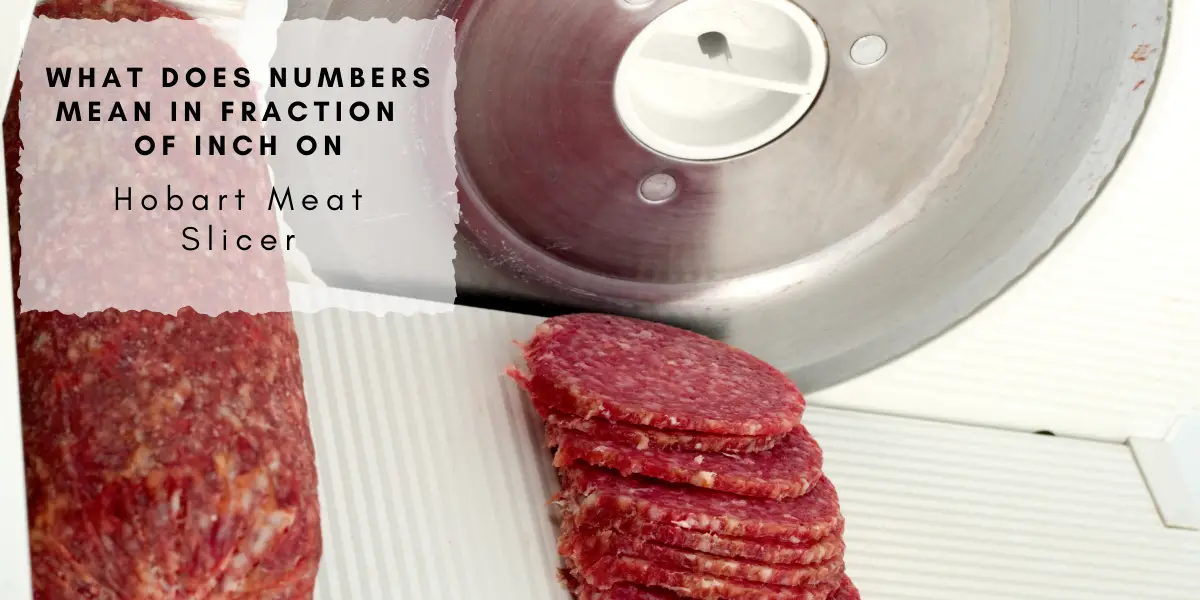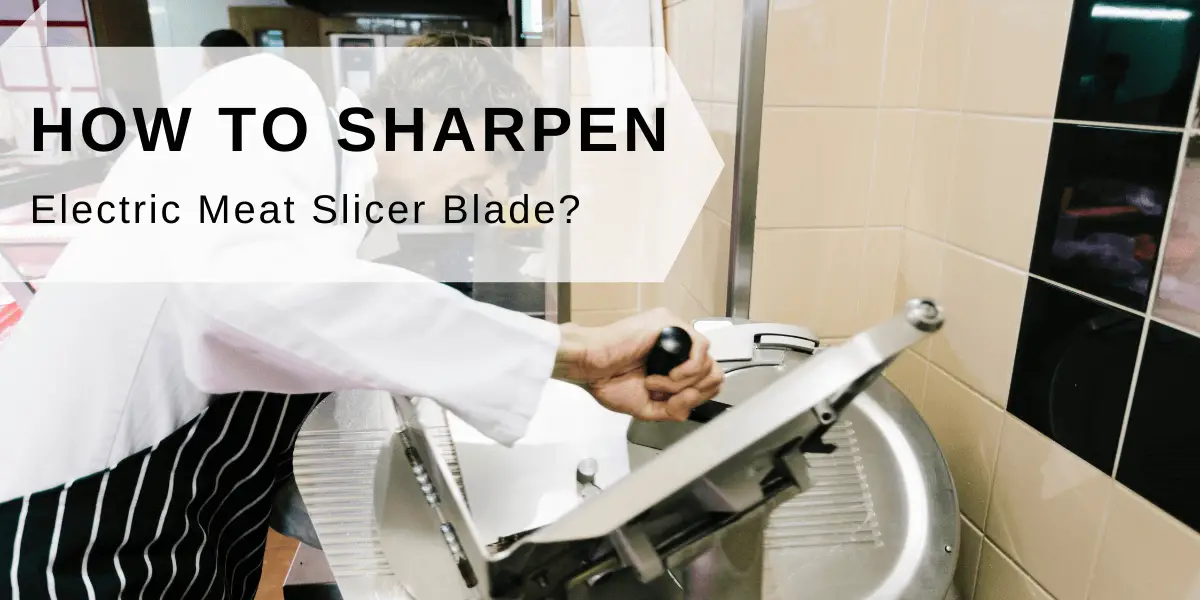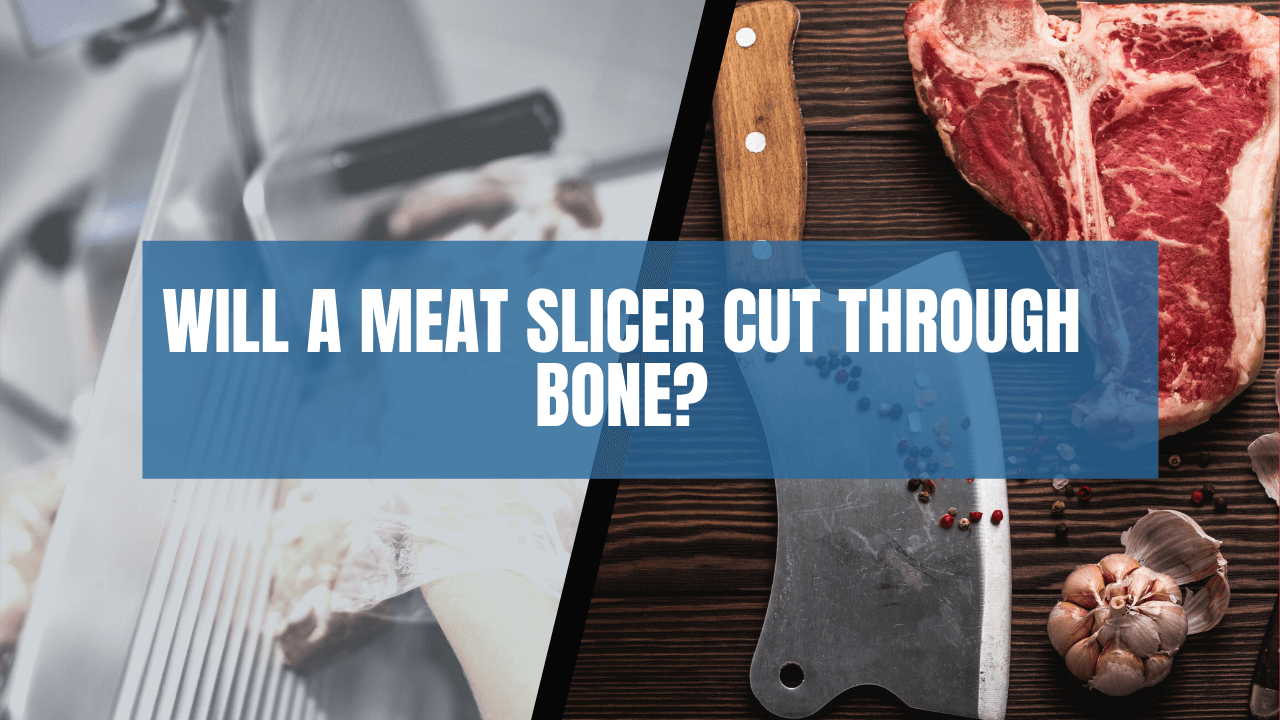Making or slicing your own deli meat can be more cost-effective and healthier than purchasing prepackaged meats, depending on the type of meat and your consumption habits.
The Impact Of Daily Deli Meat Purchases On Your Wallet

Many of us enjoy the convenience of buying deli meat every day or every week, not realizing how quickly the costs can add up. You could save significant money over time by purchasing and slicing your own deli meat. This is particularly true if you consume deli meats frequently, as buying in bulk and slicing it yourself can lead to considerable savings.
Deli Meat vs. Prepackaged: Price Comparison
Different types of deli meats have varying popularity among consumers. To illustrate the potential savings from switching from deli-sliced to prepackaged meat, we have created a table comparing the prices of various deli meat from both sources:
| Deli Meat Type | Deli Counter Sliced Price | Prepackaged Price | Price Difference |
|---|---|---|---|
| Turkey | $9.49/lb | $7.49/lb | $2.00 |
| Roast Beef | $12.99/lb | $10.49/lb | $2.50 |
| Salami | $10.99/lb | $8.99/lb | $2.00 |
| Pastrami | $11.99/lb | $9.49/lb | $2.50 |
*Prices may vary depending on location and brand.
Based on the table above, you could save between $2.00 and $2.50 per pound by switching from deli-sliced to prepackaged meat.
Deli Meat Vs. Prepackaged: Taste, Freshness, And Health Aspects
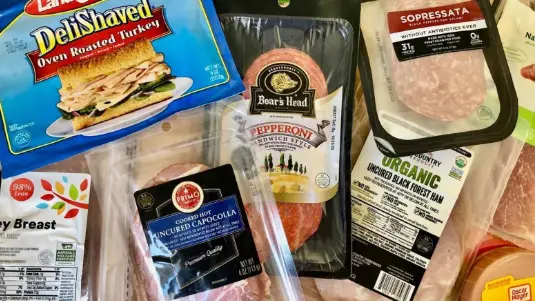
When comparing deli and prepackaged meats, taste and freshness are essential factors. Deli-sliced meat is generally fresher and has a more authentic taste as it is cut to order. On the other hand, prepackaged meats may contain preservatives and can lose flavor over time due to their longer shelf life. Regarding health, deli meats can be a better option, as they typically contain fewer additives and artificial ingredients than prepackaged meats.
Deli Lunch Meat Vs. Prepackaged Lunch Meats: Cleanliness And Sanitation
Both deli and prepackaged lunch meats have their individual cleanliness and sanitation concerns. Deli lunch meats are cut and handled by deli staff, which can introduce the risk of cross-contamination. In contrast, prepackaged lunch meats are prepared and sealed in a controlled environment, reducing the likelihood of contamination.
Deli Lunch Meat Shelf Life And Quality Vs. Prepackaged Lunch Meat Shelf Life And Quality
Deli lunch meats generally have a shorter shelf life than their prepackaged counterparts due to the lack of preservatives. This can impact quality, as deli meats may spoil more quickly. On the other hand, prepackaged meats often contain preservatives to extend their shelf life, ensuring consistent quality.
Nutritional Comparison Of Deli Lunch Meat Vs. Prepackaged Lunch Meats
Deli lunch meats have fewer additives and artificial ingredients, making them a healthier option than prepackaged meats. However, both options can be high in sodium, and it’s essential to check the nutritional labels and opt for low-sodium varieties when possible. Prepackaged meats may also contain more saturated fats and nitrates, which can have negative health impacts when consumed in large quantities. While deli and prepackaged lunch meats have pros and cons, deli meats generally offer a more nutritious option.
Why You Should Start Buying Deli Meat Instead Of Packaged Meat?
There are several reasons why you might want to consider buying deli meat instead of packaged meat:
- Better taste and freshness: Deli meats are cut to order, providing a fresher and more authentic taste than prepackaged options.
- Fewer additives and artificial ingredients: Deli meats typically contain fewer preservatives and artificial ingredients, which can be better for your health.
- Customization: When purchasing from a deli counter, you can choose the exact amount of meat you need and the thickness of the slices, allowing for greater control over your purchases.
The Cost Of Deli Sliced Vs. Prepackaged Sliced
Prepackaged meats are often cheaper than deli-sliced meats. However, there are other factors to consider when deciding between the two options. Deli meats are generally fresher, tastier, and healthier, while prepackaged meats offer convenience and a longer shelf life. Ultimately, the choice comes down to personal preference and priorities.
Tips For Slicing Your Own Deli Meat At Home
If you’re considering slicing your own deli meat at home, follow these tips to ensure a successful and enjoyable experience:
- Invest in a quality slicer: A good meat slicer will make the process easier, more efficient, and safer. Look for slicers with adjustable thickness settings, a sturdy construction, and safety features like a blade guard.
- Use a sharp knife: A sharp knife will also work if you don’t have a meat slicer. Just ensure that the blade is sharp to make clean, even cuts.
- Chill your meat: Cold meat is easier to slice, so refrigerate your meat for at least 30 minutes before slicing.

Chilled Meat - Slice against the grain: Cutting against the meat’s grain will produce more tender slices. Look for the direction of the muscle fibers and cut perpendicular to them.
- Store sliced meat properly: Use airtight containers or plastic wrap to store your sliced meat in the refrigerator. This will help maintain freshness and prevent cross-contamination.
Making The Most Of Your Deli Meat Purchases
To ensure you’re getting the best value and quality from your deli meat purchases, follow these tips:
- Shop sales and discounts: Watch for sales and promotions at your local grocery store or deli counter. Stock up on your favorite meats on sale and freeze any extra portions for later use.
- Buy in bulk: Purchasing larger portions of deli meat can save costs, especially if you consume deli meats regularly. Just be sure to store and slice the meat properly to maintain freshness.
- Opt for healthier choices: Look for deli meats with lower sodium content, fewer additives, and leaner cuts to promote a healthier diet.
- Experiment with different meats and flavors: Don’t be afraid to try new types of deli meats or ask for samples at the deli counter. You might discover a new favorite that’s both delicious and budget-friendly.
- Use your deli meats creatively: Beyond sandwiches, deli meats can be used in various dishes such as salads, wraps, and even homemade pizzas. This can help you make the most of your purchases and keep mealtime interesting.
Buying Pre-Sliced Meat Vs Whole With A Slice
| Factors | Pre-Sliced Meat | Whole Meat with a Slice |
|---|---|---|
| Convenience | High: Ready to eat and requires no additional preparation | Low: Requires additional slicing before consumption |
| Freshness | Moderate: May lose freshness over time due to packaging | High: Can be sliced fresh when needed |
| Taste | Moderate: Can lose flavor over time | High: Fresher taste as it’s sliced to order |
| Shelf Life | Longer: Contains preservatives to extend shelf life | Shorter: No preservatives, spoil faster |
| Healthiness | Moderate: May contain more additives and preservatives | Higher: Less additives and artificial ingredients |
| Customization | Limited: Fixed slice thickness and portion size | High: Can adjust slice thickness and portion size |
| Cost | Lower: Often cheaper than deli-sliced meats | Higher: May be more expensive |
| Cross-contamination Risk | Lower: Packaged in a controlled environment | Higher: Handled by deli staff |
| Environmental Impact | Higher: More packaging waste | Lower: Less packaging waste |
This table summarizes the pros, cons, and differences between buying pre-sliced meat and purchasing whole meat with a slice. By comparing these factors, you can make an informed decision based on your priorities, such as convenience, taste, cost, and health considerations.
FAQs
How good is deli meat after slicing?

Deli meat is generally at its best right after slicing, as the freshness and flavor are preserved. Over time, the quality may degrade due to exposure to air and moisture, potentially losing taste and freshness. Proper storage is essential to maintain the quality of sliced deli meat; it should be stored in airtight containers or wrapped tightly in plastic wrap and kept in the refrigerator.
Is sliced deli meat considered processed meat?

Yes, sliced deli meat is considered processed meat. Processed meats have been modified in some way to either extend their shelf life or change their taste. This modification often involves curing, smoking, or adding salt, preservatives, or other additives. Examples of processed meats include salami, pastrami, and some types of sausages. Consuming processed meats in moderation is important, as a high intake has been linked to various health concerns, such as an increased risk of heart disease and certain types of cancer.
Conclusion
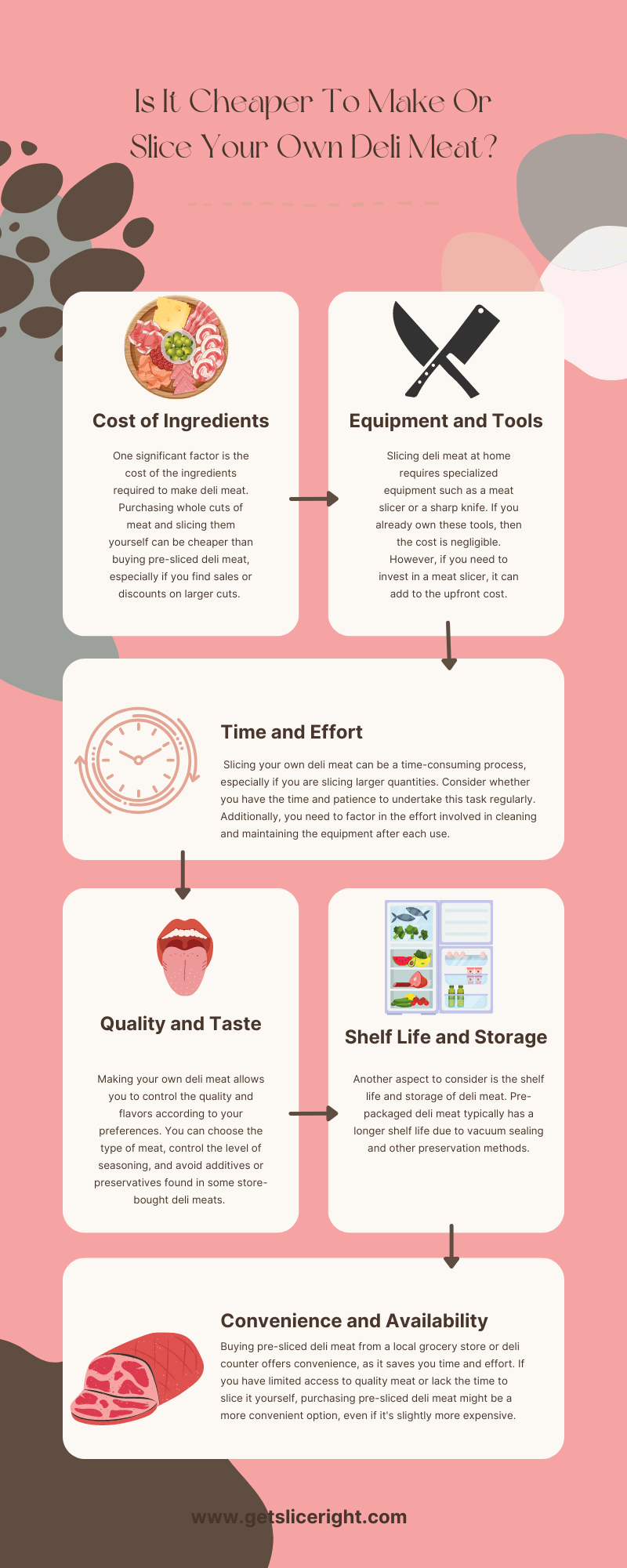
Deciding between deli-sliced and prepackaged meats comes down to personal preference, budget, and priorities. While prepackaged meats may offer cost savings and convenience, deli meats provide superior taste, freshness, and health benefits. Following the tips properly, you can make informed decisions about your deli meat purchases and save money while enjoying delicious meals.
Summary Of Key Points
- Making or slicing your own deli meat can be more cost-effective and healthier than purchasing prepackaged meats.
- Switching from deli-sliced to prepackaged meats can save between $2.00 to $2.50 per pound.
- Deli meats offer better taste, freshness, and fewer additives than prepackaged meats.
- Prepackaged meats have a longer shelf life and can be more convenient.
- Deli meats are generally healthier, with fewer artificial ingredients and preservatives.
With a bit of humor, we could say that choosing between deli and prepackaged meats is like choosing between a freshly made sandwich and a vending machine snack – it all depends on your taste buds and priorities.

Mario Batali is a renowned author, food enthusiast, and passionate chef who has dedicated his life to exploring the world of culinary arts. With a love for sharing his knowledge and experiences, Mario has become a prominent figure in the food blogging community, inspiring countless readers with his creativity and expertise.
In addition to his culinary prowess, Mario Batali is also a talented writer with a flair for engaging storytelling. He launched his own food blog to share his recipes, cooking tips, and personal experiences in the kitchen. Over time, Mario’s blog gained a loyal following of food enthusiasts who appreciate his unique approach to cooking and his dedication to using only the finest ingredients.
Mario Batali’s passion for food and his commitment to sharing his knowledge with others have made him a true inspiration in the world of culinary arts. Through his blog, cookbooks, and public appearances, Mario continues to spread his love of food and the joy of cooking with his ever-growing fanbase.

